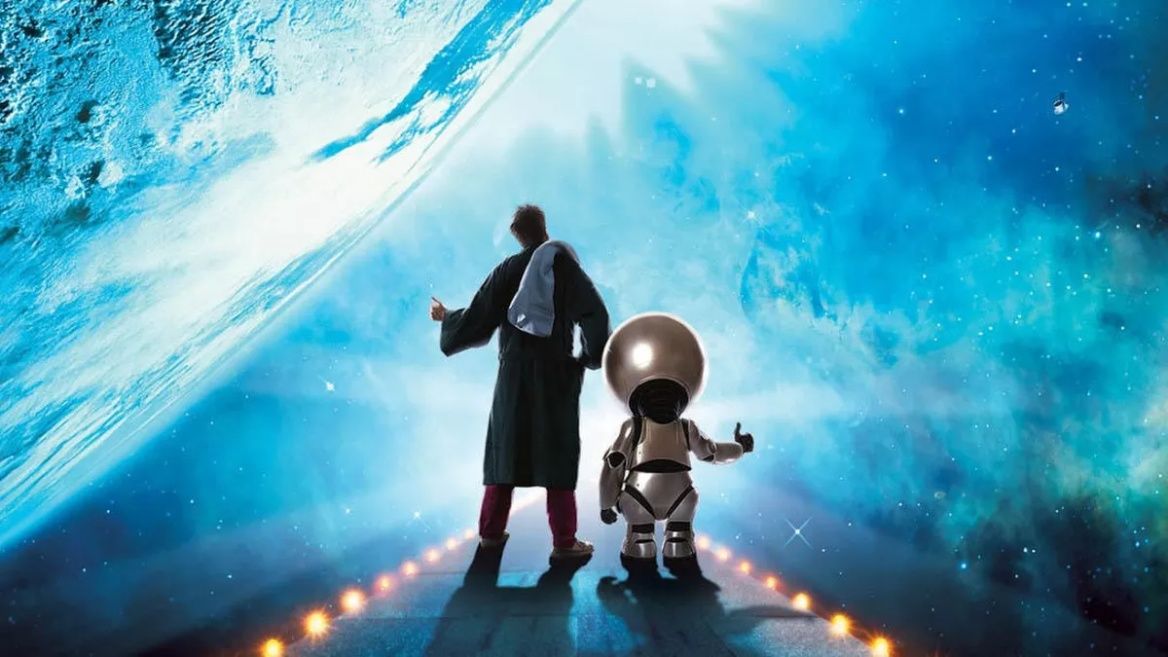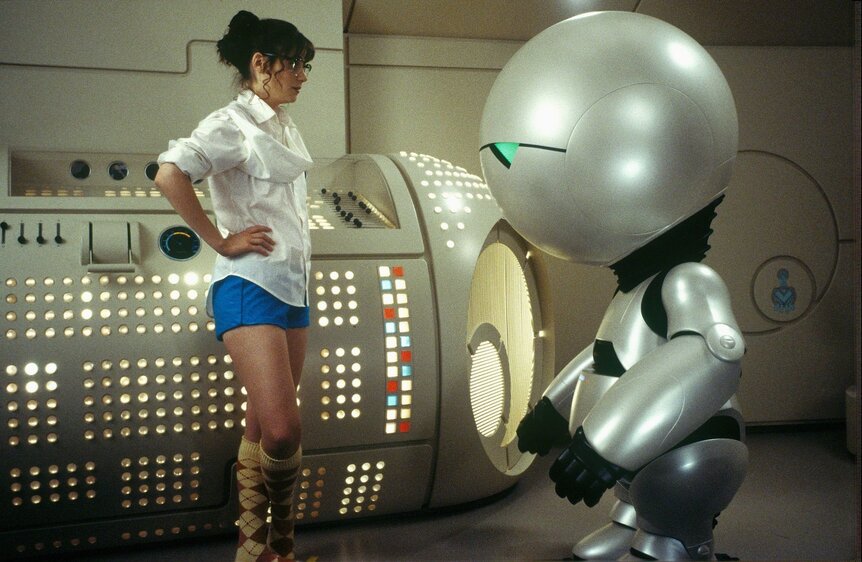Create a free profile to get unlimited access to exclusive videos, sweepstakes, and more!
Not Guilty: The Hitchhiker's Guide to the Galaxy

In Not Guilty, we look at movies and TV shows that the general consensus tells us we should feel bad for liking, but that our hearts tell us we should give a second look — "guilty pleasures" we don't feel guilty about. This time around, we turn our attention to the 2005 long-awaited and deeply divisive big-screen adaptation of The Hitchhiker's Guide to the Galaxy.
If you're a lover of science fiction in any capacity, then chances are you know and love Douglas Adams' iconic comedic saga The Hitchhiker's Guide to the Galaxy. Originally written as a radio comedy broadcast on the BBC in 1978, Adams later adapted his intergalactic capers into a series of five novels. A 1981 television adaptation followed, along with video games, comic books, stage shows, merchandising, and a literal day of towel celebration. That doesn't even take into consideration the decades-long dedication of the fandom or the fact that there are literal asteroids and species of animals named after the author and his creations. Hitchhiker's (which shall be abbreviated as H2G2 from this point forward) is endlessly creative, deeply hilarious, and almost painfully British. Its dry wit and mundane approach to the absurd helped it to shape entire generations of British comedy and genre fiction.
So it's safe to say that the prospect of Adams' work going all Hollywood put the fear in many a fan's heart. Sure, Adams had co-written the screenplay before his death in 2001 and the film would be directed by Garth Jennings, one half of Hammer & Tongs, the duo behind music videos for impeccably cool bands like Blur and R.E.M., but was that enough? How could you even begin to bring such a story to life for general audiences? What if they tried to make it all *loud whisper* American?
The long-awaited big-screen adaptation of H2G2 premiered in 2005, with Martin Freeman playing the beleaguered human Arthur Dent, whose bad Thursday only gets worse when Earth is destroyed by aliens to make way for an interstellar bypass. His best friend turns out to be an alien journalist who named himself after a car, and that girl he had a brief flirtation with at a party is now apparently the girlfriend of the President of the Galaxy, a man who has now picked them up and is dragging them across the universe to try and figure out the question — not the answer — to life, the universe, and everything. And also that guy has two heads. The movie was a soft hit at the box office, but critics were divided and fans remained skeptical. It just wasn't the same, they said, and it's true. It's not as good as the books, but how many adaptations are?
I feel that the movie of H2G2 has been unfairly maligned as an overtly Americanized bore, when in reality it's a delightfully quirky and inventive romp that, despite its evident faults, remains faithful to Douglas Adams's vision. I've got my towel and I'm ready to defend this mostly harmless movie!
The casting is (mostly) perfect.
The prospect of all these dang Americans filling the shoes of such beloved characters made some fans shudder. How do you even begin to replace the original voices from the radio series or the stars of the BBC TV adaptation, and how dare you rob them of their Britishness? It's true that not all the choices make sense here. Zooey Deschanel is just a little too twee as Trillian, although at least her character gets an arc in this story, even if it is a romantic one. You can't deny, however, that Martin Freeman is the perfect Arthur Dent. No actor working today so fully embodies that feeling of confused weariness that Freeman has made his trademark. He's curious but mostly confused, on top of being aggravated that everything he knows is now either a lie or part of some strange cosmic joke.
The stand-out among the humans is Sam Rockwell as Zaphod Beeblebrox, the two-headed President of the Galaxy. Pinned somewhere between Freddie Mercury, George W. Bush, and a 1960s surfer dude, Rockwell has an absolute blast playing this nightmare of a man who still manages to be charming enough to win you over. He's the most agonizingly perfect representation of how white dudes (human or otherwise) fail upward, and Rockwell's swaggering ineptitude and cunning are so well matched for the character, even if he is *gasp* American.
The film is also chock-full of amazing voice performances. Who else is more equipped to be the calming omniscient voice of the Guide than Stephen Fry? If you wanted answers on life, the universe, and everything, wouldn't you want Helen Mirren announcing them? The jewel in the crown is Alan Rickman as Marvin, the perpetually depressed android whose advice and bleak warnings are seldom listened to. He's so perfectly cast that you can't help but wonder why he wasn't always Marvin.
The production and character designs are spot-on.
Part of the original joy of H2G2 in its radio form was its inherently unadaptable nature. You can make all the jokes you want and create any universe you desire when it's in audio form, thus forcing the audience to imagine the antics of Arthur and company for themselves. No visual take on that can ever live up to our individual perceptions of what Zaphod or Marvin should look like. Even the original TV series, as beloved as it is, faced this problem. There are only so many ways you can make a man look like he has two heads with 1980s production budgeting (blessed be to papier-mâché).
What the 2005 movie does so well is bring those outlandish worlds and characters to life while retaining a kind of homemade quality that feels so perfectly in-line with Adams' original intentions for the story. The Vogons, in all their grotesque glory, come courtesy of Jim Henson's Creature Shop, which lends the production a welcome retro feel. Indeed, the overall commitment to practical effects whenever possible adds to the warmly old-fashioned approach that the material craves. You can't make H2G2 too glossy, after all, and the film doesn't even try to do that. That's exactly what you want from the director who gave us the happy dancing milk carton in Blur's video for "Coffee and TV."
Even in those sleeker moments, the design never tips over into full Hollywood sci-fi. The reinvention of Marvin is an excellent example of this. The original TV version showed him as a more traditional boxy sort of robot, but here (physically played by the legendary Warwick Davis) he is a stubby-limbed misery-bot with an oversized head, a reminder of his brain being the size of a planet, and he skulks around like a petulant teenager. In these aspects, H2G2 remains stridently British, and it's all the better for it.
It's really funny!
A lot of Adams' Hitchhiker appeal lies in its humor. Every page of that first book is just crammed with jokes, from the surreal to the dry to the hearty laugh-out-loud broadness that outdoes any current sitcom. Of course, these jokes were intended for the radio and rely on delivery as much as writing. The comedy works so well without visuals, and many fans worried that getting too literal with such elements would weaken the jokes.
The film certainly has a tough task on its hands in this regard, but ultimately H2G2 is still funny as hell. Those iconic jokes we're all familiar with still work on this bigger scale. The picture-book-style illustrations that accompany the Guide's words only heighten the effect, and moments as utterly surreal as a missile transforming into a whale who gains mental consciousness and giddily narrates his fall to the ground still work (it helps that the whale is voiced by British comedian Bill Bailey). Every scene with Sam Rockwell is a total riot, even when he's not spouting Adams' genius. H2G2 has always been endlessly quotable, and those moments we all know inside out work here in large part thanks to a talented cast and a committed approach to balancing that dry, low-key tone so crucial to British humor.
The biggest problem with H2G2 is something that all "unadaptable" books face: In order to condense such epic material into a bite-sized movie experience, it must close off the open-endedness of this vast universe. It cannot help but limit those ideas and expectations, but it's something that all such stories must face. Think about how much Denis Villeneuve will have to cut from Frank Herbert's grand novel to make his movie of Dune manageable for audiences, even those who are familiar with the source material.
Garth Jennings and company could never give us all the answers to life, the universe, and everything as Douglas Adams saw it, but they could offer a slice of this life that retains all the things we love about the original stories. Like all things H2G2, the movie was merely but one part of a bigger world that we all play our part in building.



























